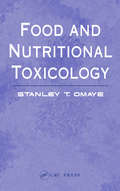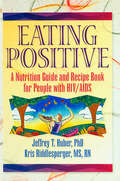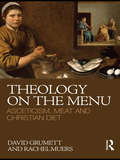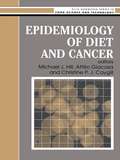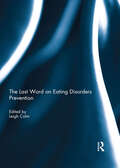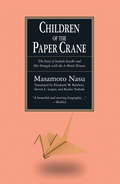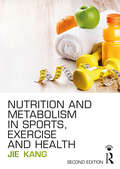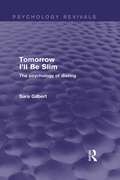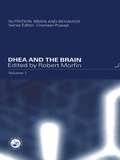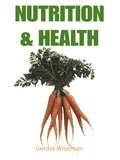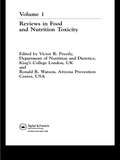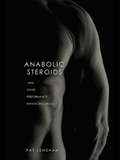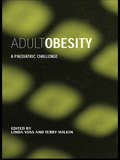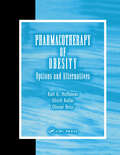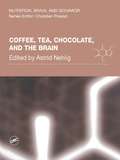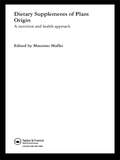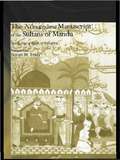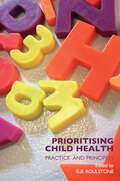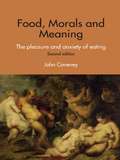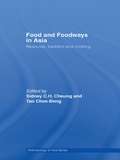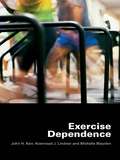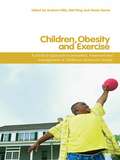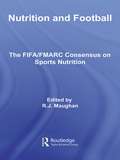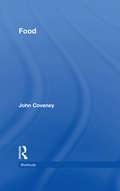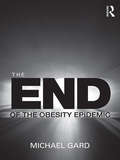- Table View
- List View
Food and Nutritional Toxicology
by Stanley T. OmayeFood and Nutritional Toxicology provides a broad overview of the chemicals in food that have the potential to produce adverse health effects. The book covers the impact on human health of food containing environmental contaminants or natural toxicants, food additives, the migration of chemicals from packaging materials into foods, and the persisten
Eating Positive: A Nutrition Guide and Recipe Book for People with HIV/AIDS
by Jeffrey T Huber Kris RiddlespergerProper nutrition is essential to individuals with HIV/AIDS. Yet, it is often difficult to maintain an adequate diet due to a variety of conditions associated with the disease and/or medications used to alleviate symptoms. Eating Positive: A Nutrition Guide and Recipe Book for People with HIV/AIDS solves this problem with easy-to-follow, enticing recipes that fit a variety of common diet restrictions and specific health needs of individuals with HIV/AIDS. You can use this practical nutrition guide and recipe book to customize diet plans for your patients or for yourself (with a doctor’s approval) that provide proper nutrition and satisfy the tastebuds.Chapters in Eating Positive are organized by diet type. Each chapter describes the diet type, its benefits and specific restrictions, and actual recipes. Each recipe is accompanied by its respective nutritional values, such as calories, fat, protein, carbohydrates, and percent of daily recommended allowance. An alphabetical index consisting of specific conditions, complications, diet titles, and food stuffs provides ease of use and quick reference. Here is just a sample of some of the many diet types, their benefits, and tasty recipes that are included:Full Liquid Diet: good for people with mouth pain and difficulty chewing as it is easy on the digestive system; recipes include: Orange Cow, Easy Egg Drop Soup, Cherry Dessert, Cottage Cheese Jello Salad, Tropical Frozen Delight, more Fiber Restricted Diet: slows bowel movement and decreases inflammation of the tissues making it a great ally in fighting diarrhea and bowel discomfort; recipes include: Sauteed Cocktail Tomatoes, Bacon Wrapped Chicken Breasts, Vegetarian Stuffed Peppers, Ham Rolls with Eggplant Filling, more Bland Diet: for those who should avoid caffeine, alcohol, spices; recipes include: Raspberry Float, Pasta Salad, Easy Tortellini Soup, One-Eyed Egyptians, Noodle Pudding, Watercress Soup, Sour Cream Coffee Cake, German Potato Dumplings, more High Protein High Calorie Diet: increased calories and nutritional content build up energy resources and assist in improving and maintaining the immune system, stopping and possibly reversing tissue wasting and weight loss and assisting in wound healing; recipes include: Garlic Pasta, Beef and Rice Creole, Spinach Cheese Pie, Tournedos of Beef with Shallot Sauce, Banana Nut Bread, Butterscotch Pie, Pineapple Coconut Cake, many moreThese diets are not prescriptions but rather guides for creating and consuming a practical diet to suit individual needs. You’ll find that Eating Positive puts individuals with HIV/AIDS on the road to a more pleasing, fulfilling, and healthy diet.
Theology on the Menu: Asceticism, Meat and Christian Diet
by David Grumett Rachel MuersFood - what we eat, how much we eat, how it is produced and prepared, and its cultural and ecological significance- is an increasingly significant topic not only for scholars but for all of us. Theology on the Menu is the first systematic and historical assessment of Christian attitudes to food and its role in shaping Christian identity. David Grumett and Rachel Muers unfold a fascinating history of feasting and fasting, food regulations and resistance to regulation, the symbolism attached to particular foods, the relationship between diet and doctrine, and how food has shaped inter-religious encounters. Everyone interested in Christian approaches to food and diet or seeking to understand how theology can engage fruitfully with everyday life will find this book a stimulus and an inspiration.
Epidemiology Of Diet And Cancer (Ellis Horwood Series In Food Science And Technology Ser.)
by M.J. Hill A. Giacosa Christine P.J. CaygillThis volume investigates the links between the incidence of diet-related cancers and dietary patterns within Europe. It presents current understanding of the major cancers thought to be caused by diet alongside detailed data on regional variations in dietary composition, and collates these sets of information to illustrate associations between food
The Last Word on Eating Disorders Prevention
by Leigh CohnFor the first time in one volume, many of the world’s most esteemed eating disorders prevention experts share their opinions and recommendations about future directions for the field. Employing "The Last Word" format of writing concise editorials about a focused area of research, authors from four countries contribute thirteen chapters with diverse points of view. The approaches range from large scale, macro-environmental calls for change through public policy to the more intimate promotion of positive youth identity for buffering against eating disorders. Included are retrospective looks at the development of prevention programs with an eye toward best practices moving forward, calls for integrating eating disorders interventions with existing efforts in the obesity and health promotion fields, examples of successful change through public policy and social justice, and a cry for gender inclusiveness, which has missing in female dominated strategies. More personal-level recommendations look at the efficacy of mindfulness, yoga, intuitive eating and exercise, and the importance of forming healthy self-identity. Informed by decades of investigation, the authors—all of whom have conducted numerous studies, programs, and research projects—offer the insights they’ve learned and the lessons that they each believe will make a difference in reducing eating disorders. This book was originally published as a special issue of Eating Disorders: The Journal of Treatment and Prevention.
The Children of the Paper Crane: The Story of Sadako Sasaki and Her Struggle with the A-Bomb Disease
by Masamoto Nasu Elizabeth W. BaldwinFirst Published in 2015. Routledge is an imprint of Taylor & Francis, an Informa company.
Nutrition and Metabolism in Sports, Exercise and Health
by Jie KangThe second edition of Nutrition and Metabolism in Sports, Exercise and Health offers a clear and comprehensive introduction to sport and exercise nutrition, integrating key nutritional facts, concepts and dietary guidelines with a thorough discussion of the fundamental biological science underpinning physiological and metabolic processes. Informed by the latest research in this fast-moving discipline, the book includes brand-new sections on, amongst others: • Cellular structure for metabolism • Alcohol and metabolism • Uncoupling protein and thermogenesis • Dietary guidelines from around the world • Nutrient timing • Protein synthesis and muscle hypertrophy • Protein supplementation • Ergogenic effects of selected stimulants • Nutritional considerations for special populations • Dehydration and exercise performance Each chapter includes updated pedagogical features, including definitions of key terms, chapter summaries, case studies, review questions and suggested readings. A revised and expanded companion website offers additional teaching and learning features, such as PowerPoint slides, multiple-choice question banks and web links. No book goes further in explaining how nutrients function within our biological system, helping students to develop a better understanding of the underlying mechanisms and offering the best grounding in applying knowledge to practice in both improving athletic performance and preventing disease. As such, Nutrition and Metabolism in Sports, Exercise and Health is essential reading for all students of sport and exercise science, kinesiology, physical therapy, strength and conditioning, nutrition or health sciences.
Tomorrow I'll Be Slim: The Psychology of Dieting (Psychology Revivals)
by Sara GilbertWhy do so many people try dieting, only to fail? What distinguishes those who succeed from those who do not? Are fat people really any different from thin people? What makes us eat, and how do we stop eating? And how can dieting trigger problems with eating normally? Originally published in 1989, Sara Gilbert discusses these questions in Tomorrow I’ll Be Slim, and draws on what is known about the psychology of eating, overeating, and weight control to dispel a number of popular myths about dieting. She shows how unsuccessful dieting can lead to new problems with eating and weight control. She points out that long-term success in slimming has more to do with individual factors such as a dieter’s expectations, self-confidence, or social and family circumstances than with ‘will-power’; and as much to do with how a diet is managed as with the content of a diet sheet. She suggests ways in which people who want to be slimmer can make a realistic assessment of their need to diet. She explains how individuals who seriously need to lose weight or change the way they eat might draw up effective strategies for themselves and prepare for the inevitable difficulties we all face whenever we try to change old habits. Finally, she addresses the problems of taking the emphasis off dieting and examining our attitudes to a slim figure as the key to happiness itself.
DHEA and the Brain (Nutrition, Brain And Behavior Ser. #Vol. 1)
by Robert MorfinDHEA and the Brain reviews a range of existing studies regarding DHEA administration to animals and humans. Chapter authors evaluate DHEA metabolism in tissues and organs, explore DHEA effects in the liver that may be of importance to the brain, and discuss recent findings regarding how DHEA is made in the brain. New perspectives about the neuropro
Nutrition and Health
by Gerald WisemanNutrition and Health is an easy-to-read introduction to the role of the human diet in maintaining a healthy body and preventing disease. Wiseman provides a concise overview of all important aspects of diet and health including:* definitions of food types* energy requirements, exercise, obesity and eating disorders* nutrition in pregnancy, children
Reviews in Food and Nutrition Toxicity
by Victor R. Preedy Ronald R. WatsonFoot and mouth disease, CJD, GM, and fears about modern methods of food production have put food safety in the spotlight. In addition, the food industry is increasingly reliant upon technological innovation, requiring anyone connected with food safety to keep abreast of the key issues and advances. Reviews in Food and Nutrition Toxicity, Vo
Anabolic Steroids: And Other Performance-enhancing Drugs
by Patrick LenehanAnabolic steroids have traditionally been controversial in the sporting arena. Today, research indicates a dramatic increase in the use of anabolic steroids and other performance-enhancing drugs outside of competitive sports. With evidence of widespread steroid abuse among the general population, health professionals are citing the emergence of an
Adult Obesity: A Paediatric Challenge
by Linda D. Voss Terence J. WilkinWhile it is increasingly clear that adult obesity begins in childhood, preventing this condition is a major challenge for the pediatrician.Adult Obesity: A Paediatric Challenge highlights the causes and consequences of obesity, bringing a modern understanding to the treatment of a heavily stigmatized problem. This collection of essays, base
Pharmacotherapy of Obesity: Options and Alternatives
by Ulrich Keller Karl G. Hofbauer Olivier BossPrimarily intended for physicians and health care professionals who are treating obese patients, this book explores current and future options for drug treatment of obesity puts them into perspective against available alternative treatments. Distinguished scientists and clinical investigators provide reviews of each individual topic, covering a wide range of subjects from pathophysiology of obesity to the benefits of weight loss. The core sections on pharmacotherapy deal with currently available drugs and drugs in pre-clinical development. These sections are complemented with sections on non-drug treatment and general therapeutic aspects. This design provides an integrated view of therapeutic approaches to the treatment of obesity and its associated syndromes.
Coffee, Tea, Chocolate, and the Brain (Nutrition, Brain And Behavior Ser. #Vol. 2)
by Astrid NehligCoffee, tea, and chocolate are among the most frequently consumed products in the world. The pleasure that many experience from these edibles is accompanied by a range of favorable and adverse effects on the brain that have been the focus of a wealth of recent research. Coffee, Tea, Chocolate, and the Brain presents new information on the
Dietary Supplements of Plant Origin: A Nutrition and Health Approach
by Massimo MaffeiDietary supplements are estimated to be used regularly by almost 60% of the American population, and over 300 million people worldwide. An important and ever-growing portion of this market is in botanical supplements that are derived from natural plants. Natural, however, does not necessarily mean safe, and although plants can provide health-essent
The Ni'matnama Manuscript of the Sultans of Mandu: The Sultan's Book of Delights (Routledge Studies in South Asia)
by Norah M. TitleyThe Ni'matnama is a late fifteenth-century book of the recipes of the eccentric Sultan of Mandu (Madhya Pradesh), Ghiyath Shahi, collected and added to by his son and successor, Nasir Shah. It contains recipes for cooking a variety of delicacies and epicurean delights, as well as providing remedies and aphrodisiacs for the Sultan and his court. It also includes important sections on the preparation of betel leaves as well as advice on the logistics of hunting expeditions and warfare. The text provides a remarkable and tantalizing account of rarified courtly life in a fifteenth-century Indian Sultanate region.
Prioritising Child Health: Practice and Principles
by Sue RoulstonePrioritisation exists throughout healthcare. Difficult and controversial decisions are frequently made at national, local and service level, as well as on an individual basis. However, attention has generally been focused away from the practitioners and service managers who make day-to-day prioritising decisions in order to manage their workloads and deliver front-line services. Focusing on child health contexts, Prioritising Child Health opens up the debate on prioritisation by individuals and explores the issues surrounding their decisions. Grounded in the reality of everyday life, it encourages the reader to make their own judgements about how to prioritise. It will appeal to professionals working in child health, including speech and language therapists, occupational therapists and physiotherapists, as well as nurses, doctors and health visitors.
Food, Morals and Meaning: The Pleasure and Anxiety of Eating
by John CoveneyFollowing on from the success of the first edition, John Coveney traces our complex relationship with food and eating and our preoccupation with diet, self-discipline and food guilt. Using our current fascination with health and nutrition, he explores why our appetite for food pleasures makes us feel anxious. This up-to-date edition includes an examination of how our current obsession with body size, especially fatness, drives a national and international panic about the obesity ‘epidemic’. Focusing on how our food anxieties have stemmed from social, political and religious problems in Western history, Food, Morals and Meaning looks at: the ancient Greeks’ preoccupation with eating early Christianity and the conflict between the pleasures of the flesh and spirituality scientific developments in eighteenth and nineteenth century Europe and our current knowledge of food the social organization of food in the modern home, based on real interviews the obesity ‘epidemic’ and its association with moral degeneration. Based on the work of Michel Foucault, this fresh and updated edition explains how a rationalization food choice – so apparent in current programmes on nutrition and health – can be traced through a genealogy of historical social imperatives and moral panics. Food, Morals and Meaning is essential reading for those studying nutrition, public health, sociology of health and illness and sociology of the body.
Food and Foodways in Asia: Resource, Tradition and Cooking (Anthropology of Asia)
by Sidney C.H. Cheung Tan Chee-BengFood is an important cultural marker of identity in contemporary Asian societies, and can provide a medium for the understanding of social relations, family and kinship, class and consumption, gender ideology, and cultural symbolism. However, a truly comprehensive view of food cannot neglect the politics of food production, in particular, how, when, from where and even why different kinds of food are produced, prepared and supplied. Food and Foodways in Asia is an anthropological inquiry providing rich ethnographic description and analysis of food production as it interacts with social and political complexities in Asia’s diverse cultures. Prominent anthropologists examine how food is related to ethnic identity and boundary formation, consumerism and global food distribution, and the invention of local cuisine in the context of increasing cultural contact. With chapters ranging from the invention of 'local food' for tourism development, to Asia's contribution to ‘world cuisine,’ Food and Foodways in Asia will be a fascinating read for anyone interested in the anthropology of food and/or Asian studies.
Exercise Dependence
by John H. Kerr Koenraad J. Lindner Michelle BlaydonExercise dependence or addiction has been described as a 'positive addiction', but it can have links with damaging dysfunctional and excessive behaviours, including eating disorders. Clinical and sport psychologists now acknowledge the condition and report that it can be found in recreational exercisers and competitive athletes. This is the first text to provide a comprehensive guide to exercise dependence. The text contains case studies and reviews research into exercise dependence in both 'exercise' and 'sports' contexts. The authors examine the condition in the widest sense, exploring different types of exercise dependence, risk factors associated with the condition, the experiences and motivational characteristics of sufferers, links with eating disorders, and a number of approaches to counselling. This text will be of significant interest to psychologists working in sport, health and clinical practice, as well as to athletes and sports coaches, particularly those involved in endurance sports associated with higher incidences of exercise dependence.
Children, Obesity and Exercise: Prevention, Treatment and Management of Childhood and Adolescent Obesity (Routledge Studies in Physical Education and Youth Sport)
by Andrew P. Hills Neil A. King Nuala M. ByrneThroughout the developed world there is an increasing prevalence of childhood obesity. Because of this increase, and awareness of the risks to long term health that childhood obesity presents, the phenomena is now described by many as a global epidemic. Children, Obesity and Exercise provides sport, exercise and medicine students and professionals with an accessible and practical guide to understanding and managing childhood and adolescent obesity. It covers: overweight, obesity and body composition; physical activity, growth and development; psycho-social aspects of childhood obesity; physical activity behaviours; eating behaviours; measuring children’s behaviour; interventions for prevention and management of childhood obesity. Children, Obesity and Exercise addresses the need for authoritative advice and innovative approaches to the prevention and management of this chronic problem.
Nutrition and Football: The FIFA/FMARC Consensus on Sports Nutrition
by R. J. MaughanNutrition and Football is a FIFA endorsed book which provides the first formal scientific consensus on players’ energy use fluid, and optimal nutritional requirements. Including: nutrition for pre-season, training, match play and in different climates analysis of the energy and metabolic demands of players in different positions water and electrolyte requirements strategies to balance effects of stress, over training and over playing ideal body composition in professional football analysis and interventions to counter late game fatigue supplements and nutrition for optimum training adaptation the effects of alcohol on metabolism, performance and general health. Each contributor to this accessible guide is an internationally recognized expert in their field and the chapters embrace all key aspects of nutrition for football. Presenting cutting-edge research, the book has a practical and applied focus and has been developed with input from practicing sports nutrition club professionals.
Food
by John CoveneyThe centrality of food in life, and the importance of food as life, is undeniable. As a source of biological substrates, personal pleasure and political power, food is and has been an enduring requirement of human biological, social and cultural existence. In recent years, interest in food has increased across the academic, public and popular spheres, fuelled by popular media’s constant play on the role of food and body size, and food and cooking, as a mass spectacle for TV audiences. In Food, a new book part of the Shortcuts Series, John Coveney examines ‘food as…’ humanness, identity, politics, industry, regulation, the environment and justice. He explores how food helps us understand what it means to be human. Through food, we construct our social identities, our families and communities, but this book also highlights the tensions between the industrialisation of food, the environment, and the fair (or otherwise) worldwide distribution of food. It considers how the food industries, on which most of us have to rely, have also had direct effects on our bodies – whether through diet and longevity, or the development of illness and diseases. This book is for all students and general readers alike – or for anyone with a fascination with food. It questions the idea that food is merely something inert on the plate, and instead shows how influential, symbolic, powerful and transformative food has come to be. This book is part of the Shortcuts series published by Routledge, a major new series of concise, accessible introductions to some of the major issues of our times.
The End of the Obesity Epidemic
by Michael GardDespite apocalyptic predictions from a vocal alliance of health professionals, politicians and social commentators that rising obesity levels would lead to a global health crisis, the crisis has not materialised. In this provocative follow up to his classic work of obesity scepticism, The Obesity Epidemic, Michael Gard argues that we have entered into a new, and perhaps terminal, phase of the obesity debate. Evidence suggests that obesity rates are levelling off in Western societies, life expectancies continue to rise in line with rising obesity rates, and across the world policy-makers have remained largely indifferent and inactive in the face of this apparently deadly threat to our health and well-being. Dissecting and dismissing much of the over-blown rhetoric and ideological bias found on both sides of the obesity debate, Gard demonstrates that the science of obesity remains radically uncertain and that it is impossible to establish an objective ‘truth’ on which to base policy. His powerful and inescapable conclusion is that we should now mark the end of the obesity epidemic. Offering a road map through the maze of claims and counter-claims, while still holding to a sceptical standpoint, this book provides an unparalleled anatomy of obesity as a scientific, political and cultural issue. It is essential reading for anybody with an interest in the science or sociology of health and lifestyle.
